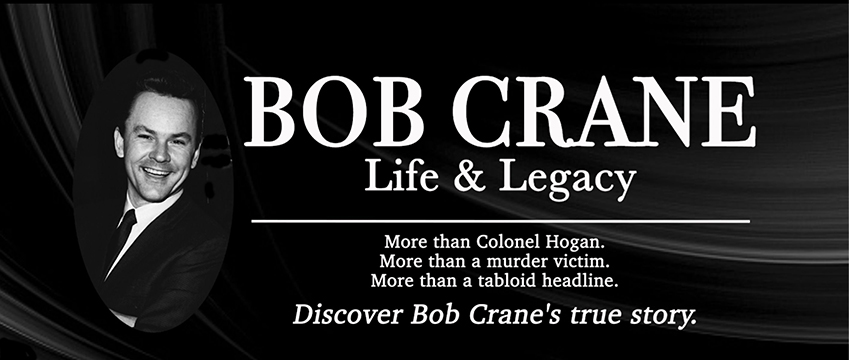Listen to "07. The Final Days of Bob Crane: Fact vs. Fiction [Part 2]" on Spreaker.
Note: This two-part episodes contains details about adult situations, including sex and murder, and is unsuitable for children. Parental discretion is advised.

On the evening of June 28, 1978, Bob Crane finished the night's production of Beginner's Luck at the Windmill Dinner Theatre in Scottsdale, Arizona. This particular run of the show seemed to not be going as well as others. On the outer cassette label of an audio tape he made of one of the performances, he had hand-written "DISASTER" on one side and "BOMB" on the other. Nevertheless, whatever he might have thought or felt was not visible to his audience. They flocked to see the Hogan's Heroes star, and they laughed and applauded throughout the show. It also didn't prevent him from happily signing his autograph on Playbills in the theatre's lobby following the performance. Bob loved his fans, and he was known to graciously give out his autograph whenever asked.Note: This two-part episodes contains details about adult situations, including sex and murder, and is unsuitable for children. Parental discretion is advised.

According to Victoria Berry Wells, who costarred in Beginner's Luck with Bob during this run, the last time she saw Bob was as he drove away with John Carpenter following the performance of June 28, 1978. When Linda Groundwater and I spoke at length with Vicky for Bob Crane: The Definitive Biography, she stressed—it was the last time she saw him alive.
What happened next during the overnight hours has been the subject of books, documentaries, podcast episodes, and the film Auto Focus. At some point, it is said that Bob Crane told Carpenter he no longer wanted to continue engaging in a sexually active lifestyle. One witness claimed she saw the two men drinking (although Bob did not drink) and dancing into the late hours. It was also reported that Bob asked a woman to return to the apartment with him, but she declined. It is widely believed that Bob and Carpenter returned to his apartment together. Carpenter claimed that he overheard Bob have an argument with his estranged wife, Patty (Sigrid Valdis). The argument was allegedly so loud, that neighbors could hear it, and they said they were worried Bob would lose his voice and might not be able to perform in the play the next night.
By 4:00 in the morning on June 29, everything was quiet.
And it was around that time that someone either silently entered Bob's apartment or was someone who never left. As Bob slept, his unknown assailant approached and delivered a fatal blow to his head, killing him instantly. Bob Crane, known the world over as Colonel Hogan, was gone.
Victoria Berry Wells had the unfortunate notoriety of being the person to find Bob dead in his apartment the next morning, when he missed an engagement with her to record a demo tape for a pilot he was pitching to a studio. The police and detectives were called, and from that moment on, speculation and scandal prevailed, misinformation and misunderstanding abounded, and a new Bob Crane was born—one who was the butt of all sex jokes, one who was tossed about with little to no understanding, and one whose life and career became a hazy blur in exchange for media glare and caricaturization.
Linda Groundwater began officially researching Bob's life in 2003, about a year after Auto Focus was released in theaters. She was met with slammed doors and ignored requests. In 2005, when Dee and I joined Linda in this quest for the truth, she had talked with just a handful of people: Al Warren and Morgan Kaolian from WICC in Bridgeport, Connecticut, and Bob's cousin Jim Senich. The three of us worked hard to earn trust, which then led to the truth.
We are not criminologists. We are not psychologists (although both Linda and I took undergrad psyche courses in college). While Bob's murder was important to us because it was how he died, it was not the intent of our book to rehash the murder—again. Our intent was to provide truth, clarity, and understanding. It was also to expose any fallacies and falsehoods, and correct them. And we did.
Our work on Bob Crane's behalf is more than just writing a book, slapping our names on the cover, and calling it a day. So many beautiful people from his life have entrusted us with their memories of their father, cousin, friend, and coworker. They would say to us, "Write the book!" and "We're in this with you!"
Linda, Dee, and I became part of Bob's inner circle. With that comes responsibility. We are now in this with them.
On this, the 42nd anniversary of the murder of Bob Crane, we present a two-part podcast episode, "The Final Days of Bob Crane: Fact vs. Fiction." As you listen, you may be surprised that the Bob Crane you thought you knew... wasn't the real Bob Crane at all.
Rest in peace, Bob. We're still on our soap box, and we're not going anywhere.
Rest in peace, Bob. We're still on our soap box, and we're not going anywhere.

Subscribe to Flipside: The True Story of Bob Crane on Apple Podcasts, Google Podcasts, Spotify, Stitcher, TuneIn Radio, Spreaker, our YouTube Channel, and everywhere podcasts are found.
